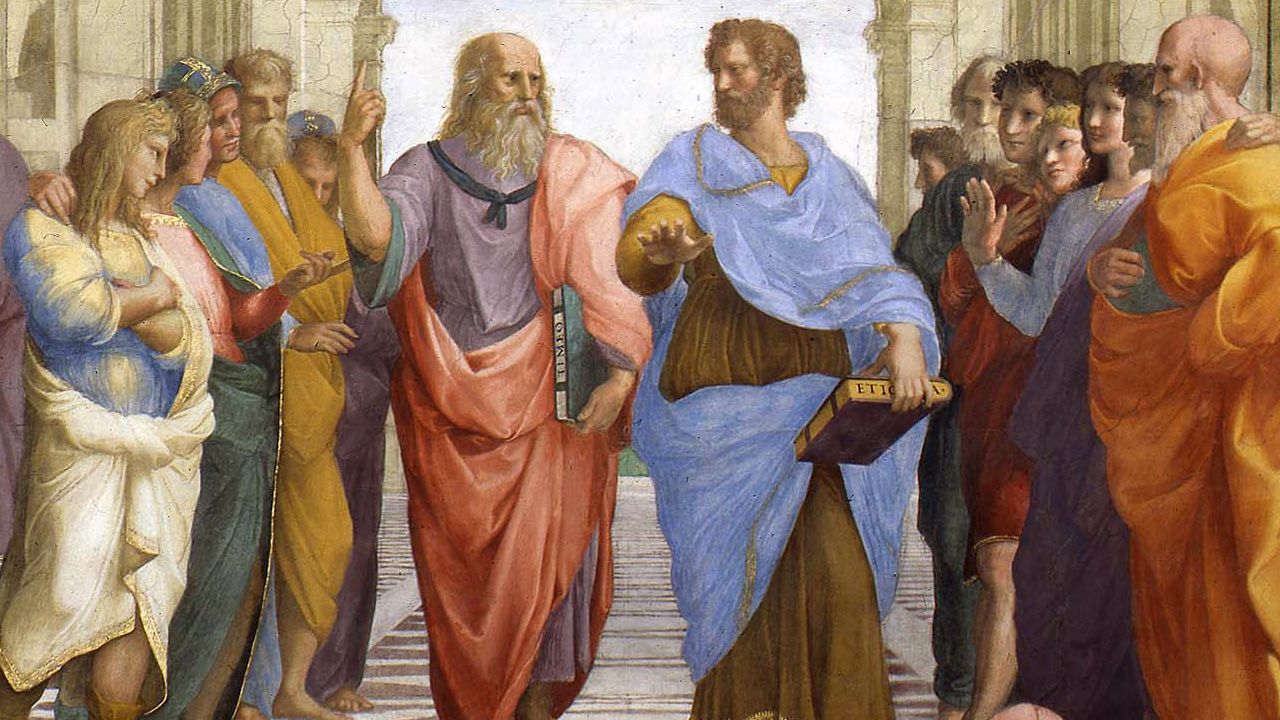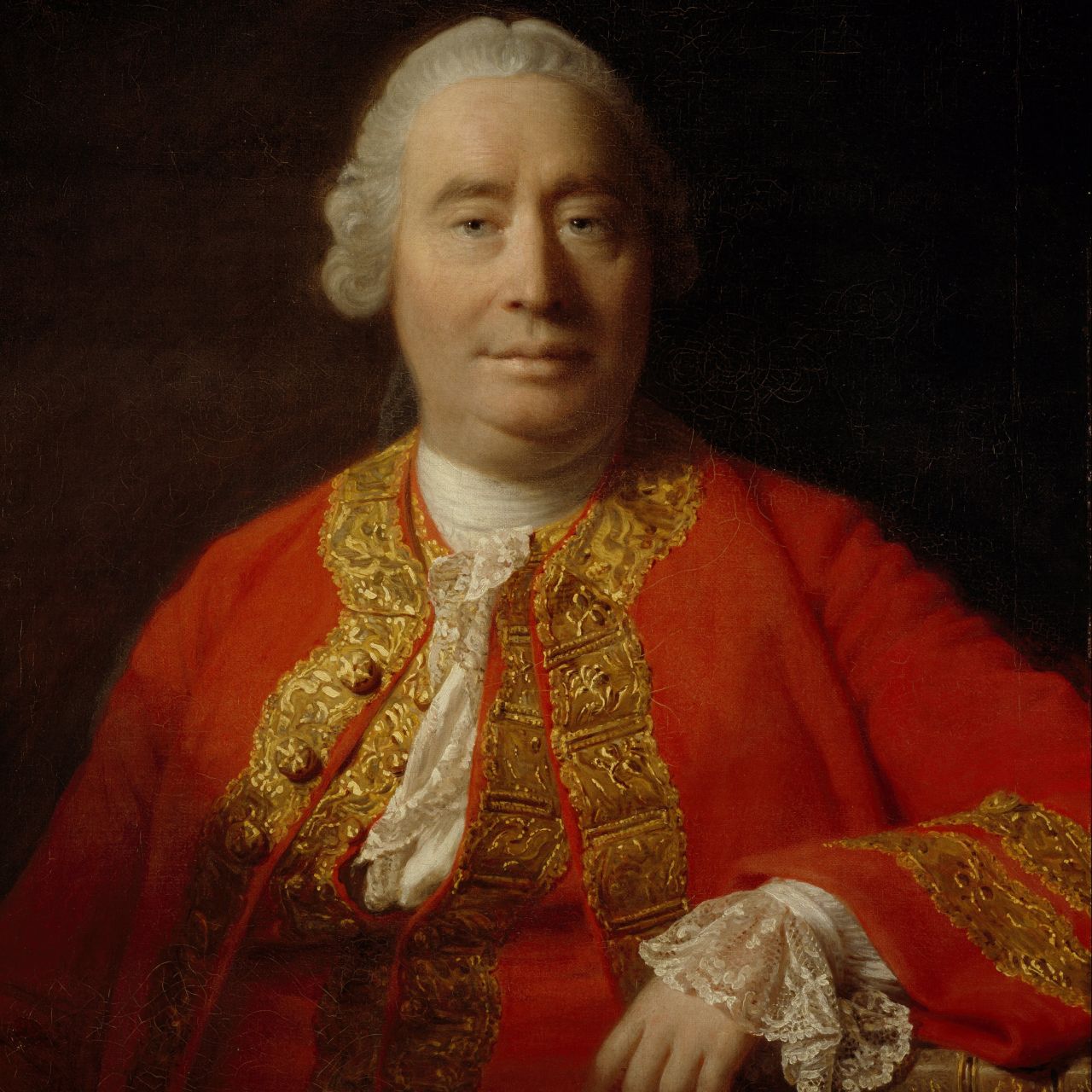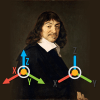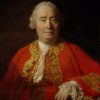What Does Philosophy Start From?
Philosophy began in ancient Greece by inquiring what arche, namely the origin of everything is. Systemics as philosophy must also answer the question. The conclusion of our systemics is arche of the world and philosophy is uncertainty. The assertions made by the previous philosophers that arche is this or that element or the subject as substratum have come from forgetting the original arche. The uncertainty precedes everything historically and theoretically.

Contents
1. The philosophy of origin and the origin of philosophy
The term “arche (ἀρχή)" is an ancient Greek word meaning a beginning, origin, first cause, the first place or power, sovereignty, dominion, command and so on[1]. It was an important theme for the ancient Greek philosophers what the arche was.
The first philosopher in the world is usually thought to be Thales of Miletus. As he left no writings, we cannot know the details of his theory, but according to the reports of his contemporaries he was surely the philosopher that tried to explain rationally that water is arche of the cosmos. Thus philosophy began as the philosophy of the beginning.
Thereafter Anaximenes regarded arche as air, Xenophanes earth, Heraclitus fire, while Empedocles adopted these four elements (water, air, earth and fire) as arche. Aristotle succeeded to the Empedocles’ theory and thanks to Aristotle’s authority the theory of the four elements had dominated the European intellectuals for a long time until it was abandoned in the early modern times.
It was, however, more abstract theory, atomism, proposed by Leucippus, the successor of Empedocles, and Democritus, Leucippus’ student, that modern scientists succeeded to. Today we no longer consider atoms to be indivisible as the Greek word “ἄτομος" originally means, but divisible into elementary particles. Are the elementary particles such as the quarks, leptons, and gauge bosons the ultimate arche, then? No one except naïve materialists would approve of it, because we do not think of this world as a mere gathering of materials.
Of the four classical elements fire alone is non-material. Werner Heisenberg interpreted Heraclitus’ arche, fire, as energy and sought some common ground between Heraclitus’ philosophy and modern physics.
Since mass and energy are, according to the theory of relativity, essentially the same concepts, we may say that all elementary particles consist of energy. This could be interpreted as defining energy as the primary substance of the world. It has indeed the essential property belonging to the term ‘substance’, that it is conserved. Therefore, it has been mentioned before that the views of modern physics are in this respect very close to those of Heraclitus if one interprets his element fire as meaning energy. Energy is in fact that which moves; it may be called the primary cause of all change, and energy can be transformed into matter or heat or light. The strife between opposites in the philosophy of Heraclitus can be found in the strife between two different forms of energy.[2]
It is true that energy conserves the quantitative identity as substance because of the first law of thermodynamics, but energy is still not all of the world. The world includes information besides matter and energy. Information is the lowness of entropy and entropy, unlike matter, cannot be reduced to energy. So, we cannot say energy is arche.
Since physics is an empirical science and its theory changes with the times, the theory of arche based on physics also can change with the times. Can’t we think of the philosophical arche that never changes with the times? Thus thinking and searching for the ultimate arche, a philosopher made a beginning for Modern Philosophy – namely René Descartes.
2. Philosophy begins with wonder and skepticism
Descartes, who found the traditional science based on uncertain principles, sought for “the first philosophy (prima philospohia)" or “the philosophical principle (principia philosophiae)" that was absolutely certain and could be the foundation of all the knowledge. The word “principle" is the combination of “first (prim-)" and “take (capere)". So, both prima philospohia and principia philosophiae meant philosophical arche to Descartes. Not only Ancient Philosophy but also Modern Philosophy began with the investigation into arche.
Descartes adopted methodological skepticism to find the philosophical arche. The first philosopher that adopted this method was not Descartes but Parmenides. “Like an ancient Descartes, he asked himself what, if anything, it was impossible not to believe; and to him the answer was est: something exists[3]" . Descartes was different from Parmenides in attributing arche not to the recognized object but the recognizing subject. He doubted everything, not only the incredible knowledge based on sense but also mathematical truth, which he had believed to be the most certain. The radical skepticism led him to the conclusion that the existence of the doubting ego became the more certain, the more he doubted. So, he made ego his philosophical arche.
You might be tempted to say that arche for Modern Philosophy from Descartes via Hegel to Husserl was the thinking subject, because they all considered the thinking subject to be the substance that made all the knowledge true, but let’s look back on the process of Descartes’ contemplation. He began his contemplation with skepticism. If he had asserted his conclusion from the beginning without the process of doubt, he would not have made himself understood.
Skepticism is trial to believe the opposite of what you have believed. It is the consciousness of uncertainty. Can’t we say then that arche for Descartes’ philosophy is uncertainty? If the world behaved as ego expected, the ego is inseparable from the world. Actually, the world often turns out to be different from what ego expected, which makes the ego conscious of the difference between the world in consciousness and the actual world, that is to say, the recognizing subject distinguished from the recognized object. It is not so much Descartes could not doubt the existence of ego in spite of the radical skepticism as he could be clearly conscious of the existence of ego beyond doubt thanks to the radical skepticism. In this way, Modern Philosophy is founded on the consciousness of uncertainty.
You might think that, as arche originally meant material substance in ancient Greece, ego or uncertainty cannot be arche, but it is not true even of Presocratic philosophers, because the Pythagoreans regarded arche as the number. Aristotle wrote concerning the Pythagoreans as follows.
Well, it is obvious that these thinkers too consider number to be arche, both as the material of things and as constituting their properties and states.[4]
Since they did not even think of the Aristotelian distinction between matter and form itself in Pythagoras’ days, it is not right to confine the extension of arche to the material substance.
Our interpretation of arche as uncertainty applies to ancient Greek Philosophy. While Aristotle succeeded to the Empedocles’ theory of the four elements as we noted, he also said that philosophy began with wonder.
It is through wonder that men now begin and originally began to philosophize; wondering in the first place at obvious perplexities, and then by gradual progression raising questions about the greater matters too, e.g. about the changes of the moon and of the sun, about the stars and about the origin of the universe.[5]
As is evident from this quotation, Aristotle thought the philosophical discussion as to “the origin of the universe", whether arche was water, air, earth or fire, began with wonder. Although Aristotle identified arche with an element (στοιχεῖον), he should distinguish the former from the latter, because the former precedes the latter.
Plato, the master of Aristotle, also said a similar thing in the name of Socrates and interpreted the name of Thaumas, the father of Iris, the messenger of heaven, as “wonder (θαῦμα)".
For this feeling of wonder shows that you are a philosopher, since wonder is the only beginning [arche] of philosophy, and he who said that Iris was the child of Thaumas made a good genealogy.[6]
Why then does philosophy begin with wonder? Wonder is a feeling arising when you find the world more than you expected. So, Plato’s or Aristotle’s recognition is equivalent to our proposition that philosophy begins with the consciousness of uncertainty.
According to Aristotle, however, philosophy is a kind of recreation or pastime and philosophers can pursue science for the sake of knowledge, and not for any practical utility, because practically all the necessities of life are supplied to them[7]. To be sure, Miletus was rich, when it produced the earliest philosophers such as Thales, Anaximander and Anaximenes. Croesus, king of Lydia, which ruled Miletus at that time, was so rich that his name became synonymous with the wealth, as is expressed in the phrase “as rich as Croesus". If however the wealth is the only condition for philosophy, why didn’t the rich before Thales in the world began philosophy? We must search for conditions for philosophy from the viewpoint of not only ability but also necessity.
Miletus was a large maritime empire possessing many colonies and traded with foreign countries ranging from Egypt to those around the Black Sea. Trading with various nations in various places, people in Miletus must have felt strongly that what they took for granted in Miletus is not necessarily a matter of course among other nations in other places. Thales became the first philosopher, not only because he was of aristocratic origin and all the necessities of life were already supplied, but also because he went to Egypt to have instruction from priests and experienced different cultures. The stronger one feels the uncertainty of culture, the stronger motivation he or she will have for seeking for certainty that transcends the cultural difference, that is to say, for philosophy.
Descartes mentioned his motive for doubting everything and inquiring into philosophical principle in Discourse on the Method.
So that the greatest advantage I derived from the study consisted in this, that, observing many things which, however extravagant and ridiculous to our apprehension, are yet by common consent received and approved by other great nations, I learned to entertain too decided a belief in regard to nothing of the truth of which I had been persuaded merely by example and custom; and thus I gradually extricated myself from many errors powerful enough to darken our natural intelligence, and incapacitate us in great measure from listening to reason.[8]
If Descartes had led a scholastic life detached from the world, he would not have tried such a radical skepticism. He traveled widely throughout Europe to read “the great book of the world[9]" instead of paper books in his study and experienced cultural relativity. Exposure to uncertainty drove him to the investigation into arche.
3. Arche as apeiron
The first philosopher who used “arche" as a philosophical term was not Thales but his pupil, Anaximander. He claimed that arche is not empirical objects such as water, air, earth and fire, but apeiron (ἄπειρον), that is to say, an indefinite or boundless substance. Anaximander’s work is mostly lost and we can know his theory from a few existing fragments, of which the following is the most famous.
Anaximander, son of Praxiades, a Milesian, the successor and pupil of Thales said that arche, the element of existing things, was apeiron, being the first to introduce this name of arche. He says that it is neither water nor any other of the so-called elements, but some other apeiron nature, from which come into being all the heavens and the worlds in them. And the source of coming-to-be for existing things is that into which destruction, too, happens “according to necessity; for they pay penalty and retribution to each other for their injustice according to the arrangement of time," as he describes it in these rather poetical terms. It is clear that he, seeing the changing of the four elements into each other, thought it right to make none of these the substratum, but something else besides these; and he produces coming-to-be not through the alteration of the element, but by the separation off of the opposites through the eternal motion.[10]
Why is apeiron arche, then? Aristotle demonstrated it as follows.
Everything is either arche or derived from arche. But there cannot be arche of the infinite (apeiron), for that would be a limit of it.[11]
Does the infinite cease to be infinite if it has its limit? There are, for example, an infinite number of real numbers between 0 and 1. It indicates that the infinite can have its limit. Aristotle’s demonstration holds better, if arche is the whole instead of the infinite. In that case his demonstration would be as follows.
Arche is the whole, because, if the cause of the whole existed outside it, the whole would be no longer the whole. Therefore the whole must have its cause within it. Since the whole produces everything including itself, the whole is arche.
This proposition is just a tautology, “The whole is the whole." It remains empty unless the content of the whole is identified. Moreover, his interpretation of apeiron as the infinite whole is historically doubtful.
No thought is irrelevant to the traditional thought. Thales, who regarded water as arche, and Anaximander, who regarded apeiron as arche, reflected the influence of the mythical cosmogony of Hesiod, who regarded chaos as arche, and further retrospectively the Babylonian cosmology, “Enuma Elish (Enûma Eliš)", which described the earliest stage of the universe as watery chaos represented by two gods, Apsû and Tiamat. Taking this tradition into consideration, Anaximander’s concept “apeiron" is not the unlimited whole but chaos without boundary. So, our interpretation of arche as uncertainty has historical legitimacy.
You might still be reluctant to accept this interpretation, for the previous philosophers such as Descartes attributed arche to the principle that negates uncertainty, but the arche of the various concepts of arche is uncertainty and taking what denies uncertainty for arche has come from forgetting the original arche, uncertainty.
It applies not only philosophy but also religion. “Enuma Elish" described the earliest stage of the universe as follows.
When the sky above was not named, And the earth beneath did not yet bear a name, And the primeval Apsû, who begat them, And chaos, Tiamat, the mother of them both, Their waters were mingled together, And no field was formed, no marsh was to be seen; When of the gods none had been called into being.[12]
This myth was formed in Mesopotamia, when matriarchal religion was dominant. The matriarchal religion usually models its cosmogony after a fetus growing in amniotic fluid. The Babylonian cosmogony, where Tiamat is a primordial goddess of the ocean, is also matriarchal. Although Judaism is a patriarchal religion, “Genesis" leaves some traces of matriarchal cosmogony.
In the beginning God created the heaven and the earth. And the earth was without form, and void; and darkness was upon the face of the deep. And the Spirit of God moved upon the face of the waters. And God said, Let there be light: and there was light.[13]
At the beginning of “Gospel of John" the matriarchal vestiges are wiped out from its cosmogony and the Word (Λόγος) as God is declared to be arche.
In the beginning was the Word, and the Word was with God, and the Word was God. The same was in the beginning with God. All things were made by him; and without him was not any thing made that was made.[14]
As is evident from these, the precedence of darkness (chaos) over light (order) has been reversed with the times. Thales and Anaximander attributed arche to maternal chaos, while Heraclitus to paternal fire as logos. The relation was completely reversed in Platonic idealism. The true arche of Descartes’ philosophy, uncertainty, was forgotten, when he discovered ego as the philosophical principle, and the uncertainty was denied by the logos of the thinking subject. In spite of this reversal and because of this reversal, arche is uncertainty.
If we are allowed to interpret apeiron as uncertainty, we can find a point of agreement between Anaximander’s philosophy and our systemics. Uncertainty is the unselected mixture of the opposites such as hot versus cold, dry versus wet. Selecting one and excluding the other option result in limiting the unlimited uncertainty and forming the structure of the system. The basic idea of our systemics is that a system is the subject of selection and through the selection a system differentiates its structure from its environment.
Anaximander “produces coming-to-be not through the alteration of the element, but by the separation off of the opposites through the eternal motion." Simplicius noted, “the opposites mean hot and cold, dry and wet etc.[15]" The combination of the two opposites result in hot + dry, hot + wet, cold + dry, and cold + wet. These four combinations correspond to the four elements, fire, air, earth and water. When something new comes into being, it does not result from altering one element into another, but from choosing one and discarding the other option.
According to Anaximander existing things that came into being from apeiron are destructed and return to apeiron. Most of researchers cannot accept his personified description, “they pay penalty and retribution to each other for their injustice according to the arrangement of time", but there still remains the room for rational interpretation. Systems sustain themselves through selection, but when they select the wrong option, they fail to sustain themselves, that is to say, they cannot differentiate themselves from their environment and return to uncertainty as arche. Anaximander’s proposition reads as the personification of this.
4. Arche as uncertainty
Plato and Aristotle were right in recognizing that philosophy begins with wonder. Uncertainty as arche is not the intra-horizontal uncertainty that is conceived of as a probability and does not surprise the expectant. Once conceived in the horizon of consciousness, uncertainty is greatly diminished. Uncertainty as arche is the trans-horizontal uncertainty that surprises the expectant. Because the function of consciousness systems is the negation of uncertainty, the world can enter consciousness only via the negation of uncertainty. In this sense uncertainty, arche of the world, must be the trans-horizontal uncertainty that is still not internalized in the horizon of consciousness.
“Arche" has been confused with “element (στοιχεῖον)" or “substratum (ὑποκείμενον)" since the age of ancient Greece. But elements are derivatives made by reducing uncertainty and substratum is the subject that makes its structure of elements to reduce uncertainty. Both elements and substratum come out of the vast ocean of uncertainty, float on it and then, failing to maintain themselves, sink into it. History of systems is the repetition of this.
You might think that, if uncertainty brings about wonder, certainty without wonder should precede the uncertainty and therefore the certainty should be arche. But, because the certainty preceding the original uncertainty does not enter consciousness, it is as good as nonexistent. Certainty is only conceivable in the relation to uncertainty and the alternative of certainty or uncertainty produces uncertainty at the meta-level. The concept of certainty that precedes consciousness does not precede consciousness. It is a derivative concept derived from the original uncertainty.
The previous systems theories have treated elements as arche, combined elements into complexity and explained systems in terms of complexity. As a result the researchers have been bogged down over the problem such as what the ultimate element of every system is or what the element proper to this or that system is. Such a debate puts the cart before the horse. As elements are just means to reduce uncertainty, which element to select depends on which uncertainty to reduce. Our systemics is different from the previous systems theories from the start.
5. References
- ↑An Intermediate Greek-English Lexicon, ἀρχή (author) Henry George Liddell, Robert Scott.
- ↑“Physics and Philosophy: The Revolution in Modern Science" Physics and Philosophy: The Revolution in Modern Science (author) Werner Heisenberg (page) 71.
- ↑A History of Greek Philosophy: Volume 2, The Presocratic Tradition from Parmenides to Democritus (author) W. K. C. Guthrie (page) 20.
- ↑“φαίνονται δὴ καὶ οὗτοι τὸν ἀριθμὸν νομίζοντες ἀρχὴν εἶναι καὶ ὡς ὕλην τοῖς οὖσι καὶ ὡς πάθη τε καὶ " Metaphysics, Book 1, section 986a (author) Aristotle.
- ↑“διὰ γὰρ τὸ θαυμάζειν οἱ ἄνθρωποι καὶ νῦν καὶ τὸ πρῶτον ἤρξαντο φιλοσοφεῖν, ἐξ ἀρχῆς μὲν τὰ πρόχειρα τῶν ἀτόπων θαυμάσαντες, εἶτα κατὰ μικρὸν οὕτω προϊόντες καὶ περὶ τῶν μειζόνων διαπορήσαντες, οἷον περί τε τῶν τῆς σελήνης παθημάτων καὶ τῶν περὶ τὸν ἥλιον καὶ ἄστρα καὶ περὶ τῆς τοῦ παντὸς γενέσεως." Metaphysics, Book 1, section 982b (author) Aristotle.
- ↑“μάλα γὰρ φιλοσόφου τοῦτο τὸ πάθος, τὸ θαυμάζειν: οὐ γὰρ ἄλλη ἀρχὴ φιλοσοφίας ἢ αὕτη, καὶ ἔοικεν ὁ τὴν Ἶριν Θαύμαντος ἔκγονον φήσας οὐ κακῶς γενεαλογεῖν." Theaetetus, section 155d (author) Plato.
- ↑Metaphysics, Book 1, section 982b (author) Aristotle.
- ↑“En sorte que le plus grand profit que j’en retirais était que, voyant plusieurs choses qui, bien qu’elles nous semblent fort extravagantes et ridicules, ne laissent pas d’être communément reçues et approuvées par d’autres grands peuples, j’apprenois à ne rien croire trop fermement de ce qui ne m’avoit été persuadé que par l’exemple et par la coutume : et ainsi je me délivrois peu à peu de beaucoup d’erreurs qui peuvent offusquer notre lumière naturelle, et nous rendre moins capables d’entendre raison." Discours de la méthode (section) Première partie (author) René Descartes.
- ↑“le grand livre du monde" Discours de la méthode (section) Première partie (author) René Descartes.
- ↑“Ἀναξίμανδρος μἐν Πραξιάδου Μιλήσιος Θαλοῦ γενόμενος διάδοχος καὶ μαθητὴς ἀρχήν τε καὶ στοιχεῖον εἴρηκε τῶν ὄντων τὸ ἄπειρον, πρῶτος τοῦτο τοὔνομα κομίσας τῆς ἀρχῆς. λέγει δ’ αὐτὴν μήτε ὕδωρ μήτε ἄλλο τι τῶν καλουμένων εἶναι στοιχείων, ἀλλ’ ἑτέραν τινὰ φύσιν ἄπειρον, ἐξ ἧς ἅπαντας γίνεσθαι τοὺς οὐρανοὺς καὶ τοὺς ἐν αὐτοῖς κόσμους· ἐξ ὧν δὲ ἡ γένεσίς ἐστι τοῖς οὖσι, καὶ τὴν φθορὰν εἰς ταῦτα γίνεσθαι κατὰ τὸ χρεών· διδόναι γὰρ αὐτὰ δίκην καὶ τίσιν ἀλλήλοις τῆς ἀδικίας κατὰ τὴν τοῦ χρόνου τάξιν, ποιητικωτέροις οὕτως ὀνόμασιν αὐτὰ λέγων. δῆλον δὲ ὅτι τὴν εἰς ἄλληλα μεταβολὴν τῶν τεττάρων στοιχείων οὗτος θεασάμενος οὐκ ἠξίωσεν ἕν τι τούτων ὑποκείμενον ποιῆσαι, ἀλλά τι ἄλλο παρὰ ταῦτα· οὗτος δὲ οὐκ ἀλλοιουμένου τοῦ στοιχείου τὴν γένεσιν ποιεῖ, ἀλλ’ ἀποκρινομένων τῶν ἐναντίων διὰ τῆς αἰδίου κινήσεως." Commentary on Aristotle’s Physics. p.24, 13-25 sq (author) Simplicius.
- ↑“ἅπαντα γὰρ ἢ ἀρχὴ ἢ ἐξ ἀρχῆς, τοῦ δὲ ἀπείρου οὐκ ἔστιν ἀρχή. εἴη γὰρ ἂν αὐτοῦ πέρας." Φυσικά (author) Αριστοτέλης.
- ↑“e-nu-ma e-liš la na-bu-ú šâ-ma-mu šap-liš am-ma-tum šu-ma la zak-rat ZUAB ma reš-tu-ú za-ru-šu-un mu-um-mu ti-amat mu-al-li-da-at gim-ri-šú-un A-MEŠ-šú-nu iš-te-niš i-ḫi-qu-ú-šú-un gi-pa-ra la ki-is-su-ru su-sa-a la še-'u-ú e-nu-ma DINGIR-DINGIR la šu-pu-u ma-na-ma" Enûma Eliš, Tablet 1.
- ↑“בראשית ברא אלהים את השמים ואת הארץ והארץ היתה תהו ובהו וחשך על פני תהום ורוח אלהים מרחפת על פני המים ויאמר אלהים יהי אור ויהי אור " בראשית א כתיב .
- ↑“Ἐν ἀρχῇ ἦν ὁ Λόγος, καὶ ὁ Λόγος ἦν πρὸς τὸν Θεόν, καὶ Θεὸς ἦν ὁ Λόγος. Οὗτος ἦν ἐν ἀρχῇ πρὸς τὸν Θεόν. πάντα δι’ αὐτοῦ ἐγένετο, καὶ χωρὶς αὐτοῦ ἐγένετο οὐδὲ ἕν ὃ γέγονεν." Κατά Ιωάννην.
- ↑“ἐναντιότητες δέ εἰσι θερμόν, ψυχρόν, ξηρόν, ὑγρὸν καὶ τὰ ἄλλα" Commentary on Aristotle’s Physics. p. 150, 24 sq (author) Simplicius.








Discussion
New Comments
No comments yet. Be the first one!